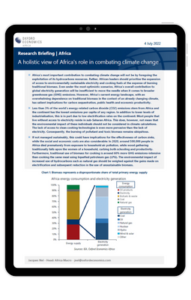A holistic view of Africa’s role in combating climate change
 Africa’s most important contribution to combating climate change will not be by foregoing the exploitation of its hydrocarbons resources. Rather, African leaders should prioritise the expansion of access to environmentally sustainable electricity and cooking fuels at the expense of burning traditional biomass. Even under the most optimistic scenarios, Africa’s overall contribution to global electricity generation will be insufficient to move the needle when it comes to broader greenhouse gas (GHG) emissions.
Africa’s most important contribution to combating climate change will not be by foregoing the exploitation of its hydrocarbons resources. Rather, African leaders should prioritise the expansion of access to environmentally sustainable electricity and cooking fuels at the expense of burning traditional biomass. Even under the most optimistic scenarios, Africa’s overall contribution to global electricity generation will be insufficient to move the needle when it comes to broader greenhouse gas (GHG) emissions.
What you will learn:
- Africa’s most important contribution to combating climate change will not be by foregoing the exploitation of its hydrocarbons resources. Rather, African leaders should prioritise the expansion of access to environmentally sustainable electricity and cooking fuels at the expense of burning traditional biomass.
- The continent’s current energy landscape, with an overwhelming dependence on traditional biomass in the context of an already changing climate, has salient implications for carbon sequestration, public health and economic productivity.
- Traditional use of biomass for cooking is around 60% more GHG emissions-intensive than cooking the same meal using liquefied petroleum gas (LPG). The environmental impact of increased use of hydrocarbons such as natural gas should be weighed against the gains made on electrification and subsequent reduction in the use of unsustainable biomass.
Tags:
Related Services

Service
Africa Forecasting Service
Comprehensive analysis of immediate and long-term economic and political prospects to inform investment strategies, expansion and African operations through forecasts and commentary by country, industry, and city.
Find Out More
Service
Global Industry Service
Gain insights into the impact of economic developments on industrial sectors.
Find Out More

Service
MENA Forecasting Service
Monitor the implications of economic and market developments in the MENA region.
Find Out More